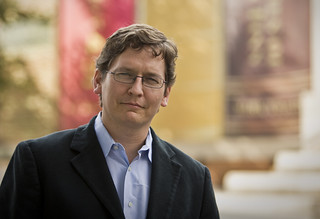#cc10 Featured Platform: Vimeo
lundi 10 décembre 2012 à 07:10In honor of Creative Commons’ tenth anniversary, we’re profiling several media platforms with CC integration. Vimeo has supported CC licensing since 2010, and has accumulated over two million CC-licensed videos. When I spoke with VP of creative development Blake Whitman, he told me that Vimeo’s staff and community had been talking about CC for years prior. “We knew that this would be perfect for the type of community that Vimeo has. There’s a lot of remixing going on, and it made a lot of sense for us to incorporate it. We thought it was a great web standard that needed to be solidified in our space.”
I also asked Blake to recommend some of his favorite CC-licensed videos on Vimeo. Two of those are embedded in this interview; the rest are listed below.
Tell me more about how CC licensing fits into the Vimeo community.
The beginnings of Vimeo were really about sharing and collaboration, doing projects together, and sharing life’s moments. It’s evolved over time – as we added HD and other featured that attract higher-end creators – but that ethos has always stayed the same. We’ve always given users the option to make their vidoes available for download. It’s important that when people make their content available for download, there’s a clear way for the creator to indicate how they’d like that content to be used.
For a long time, we didn’t have that. You could make it explicit in the description that there was a CC license on it, but since it wasn’t built into Vimeo, it wasn’t being used consistently. When people download videos, they should know what the rights are that the creators are intending.
The Mountain from TSO Photography on Vimeo.
How much did you publicize the CC implementation? Were there any hiccups or pushback from the community?
There’s always a period of learning for anything new, but we work very hard to make it clear. It’s crucial that people understand how the licenses work – and not just for videos. I want users to understand CC licensing on a deeper level, as a part of sharing on the Internet at large.
Do you think that Creative Commons has changed the Vimeo community’s attitudes about sharing?
It’s always changing and evolving, as smaller communities within Vimeo expand and contract and branch out.
People are open willing to share, and CC is a model that makes sense. Look how many people are allowing their content to be used for commercial purposes. And that’s pretty amazing, that people are that open to allow for people to make money from the stuff that they create, as long as they’re cited. That’s great, and I think it’s really important.
Everything is a Remix Part 1 from Kirby Ferguson on Vimeo.
Blake’s favorite CC-licensed videos on Vimeo:



